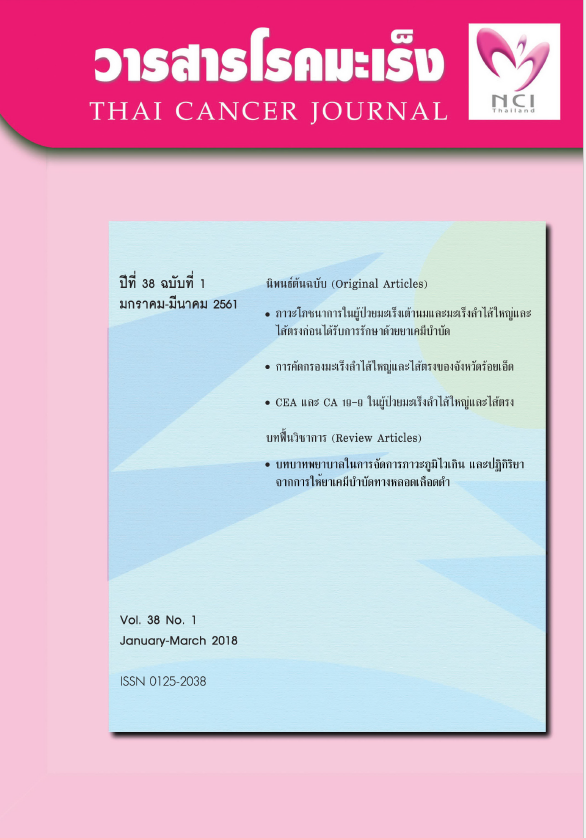Nutritional Status in Breast Cancer and Colorectal Cancer Patients before Undergoing Chemotherapy
Keywords:
nutritional status, breast cancer, colorectal cancer, chemotherapyAbstract
Currently, cancers are the leading cause of morbidity and mortality worldwide; this is also true for Thailand, especially breast and colorectal cancers. One of the essential problems for cancer patients is malnutrition, which has negative impacts on treatment outcomes and impairs quality of life. Furthermore, among cancer patients treated with chemotherapy, malnutrition may increase the risk of chemotherapy-induced toxicities and result in chemotherapy dose reductions and delays, which can compromise long-term clinical outcomes. This cross-sectional study aimed to assess the nutritional status of breast-cancer and colorectal-cancer patients before undergoing chemotherapy and identify the factors associated with malnutrition. Nutritional status was assessed using the Subjective Global Assessment (SGA) among 50 breast-cancer and 46 colorectal-cancer patients, for whom the first cycle of chemotherapy was scheduled in January- September 2017 at the Outpatient Chemotherapy Center, King Chulalongkorn Memorial Hospital, Bangkok. The prevalence of malnutrition was found to be significantly higher among colorectalcancer patients than breast-cancer patients, at 34.8% and 6.0%, respectively (P<0.001). The study also showed that older age, metastatic cancer, the presence of comorbidity and anemia, were associated with malnutrition. The study findings can help plan appropriate nutritional care for cancer patients before chemotherapy.
References
Van Cutsem E, Arends J. The causes and consequences of cancer-associated malnutrition. Eur J Oncol Nurs 2005;9:S51-63.
Marin Caro MM, Laviano A, Pichard C. Nutritional intervention and quality of life in adult oncology patients. Clin Nutr 2007;26:289-301.
Alvarez-Hernandez J, Planas Vila M, Leon-Sanz M, Garcia de Lorenzo A, Celaya-Perez S, Garcia-Lorda P, et al. Prevalence and costs of malnutrition in hospitalized patients; the PREDyCES Study. Nutr Hosp 2012;27:1049-59.
Waitzberg DL, Caiaffa WT, Correia MI. Hospital malnutrition: the Brazilian national survey (IBRANUTRI): a study of 4000 patients. Nutrition 2001;17:573-80.
Wie GA, Cho YA, Kim SY, Kim SM, Bae JM, Joung H. Prevalence and risk factors of malnutrition among cancer patients according to tumor location and stage in the National Cancer Center in Korea. Nutrition 2010;26:263-8.
Pressoir M, Desne S, Berchery D, Rossignol G, Poiree B, Meslier M, et al. Prevalence, risk factors and clinical implications of malnutrition in French Comprehensive Cancer Centres. Br J Cancer 2010; 102:966-71.
Silva FR, de Oliveira MG, Souza AS, Figueroa JN, Santos CS. Factors associated with malnutrition in hospitalized cancer patients: a croos-sectional study. Nutr J 2015;14:123.
Yu K, Zhou XR, He SL. A multicentre study to implement nutritional risk screening and evaluate clinical outcome and quality of life in patients with cancer. Eur J Clin Nutr 2013;67:732-7.
Bozzetti F, Mariani L, Lo Vullo S, Amerio ML, Biffi R, Caccialanza G, et al. The nutritional risk in oncology: a study of 1453 cancer outpatients. Support Care Cancer 2012;20:1919-28.
Hebuterne X, Lemarie E, Michallet M, de Montreuil CB, Schneider SM, Goldwasser F. Prevalence of malnutrition and current use of nutrition support in patients with cancer. JPEN J Parenter Enteral Nutr 2014;38:196-204.
von Meyenfeldt M. Cancer-associated malnutrition: an introduction. Eur J Oncol Nurs 2005;9:S35-8.
National Cancer Institute Thailand. Hospital-Based Cancer Registry Annual Report 2012. Bangkok; 2014. Available at: https://www.m-society.go.th/article_attach/11832/16129.pdf. Accessed Nov 28, 2017.
Detsky AS, McLaughlin JR, Baker JP, Johnston N, Whittaker S, Mendelson RA, et al. What is subjective global assessment of nutritional status? JPEN J Parenter Enteral Nutr 1987;11:8-13.
Arends J, Bachmann P, Baracos V, Barthelemy N, Bertz H, Bozzetti F, et al. ESPEN guidelines on nutrition in cancer patients. Clin Nutr 2017;36:11-48.
Shirodkar M, Mohandas KM. Subjective global assessment: a simple and reliable screening tool for malnutrition among Indians. Indian J Gastroenterol 2005;24:246-50.
Arrieta O, De la Torre-Vallejo M, Lopez-Macias D, Orta D, Turcott J, Macedo-Perez EO, et al. Nutritional Status, Body Surface, and Low Lean Body Mass/Body Mass Index Are Related to Dose Reduction and Severe Gastrointestinal Toxicity Induced by Afatinib in Patients With Non-Small Cell Lung Cancer. Oncologist 2015;20:967-74.
Gupta D, Lammersfeld CA, Vashi PG, Dahlk SL, Lis CG. Can subjective global assessment of nutritional status predict survival in ovarian cancer? Journal of Ovarian Research 2008;1:5.
Bering T, Mauricio SF, Silva JB, Correia MI. Nutritional and metabolic status of breast cancer women. Nutr Hosp 2014;31:751-8.
Nourissat A, Mille D, Delaroche G, Jacquin JP, Vergnon JM, Fournel P, et al. Estimation of the risk for nutritional state degradation in patients with cancer: development of a screening tool based on results from a cross-sectional survey. Ann Oncol 2007;18:1882-6.
ยุคล จันทเลิศ. การประยุกต์ใช้แบบคัดกรองภาวะโภชนาการในผู้ป่วยนอกโรคมะเร็งที่ได้รับยาเคมีบำบัด ณ โรงพยาบาลพระปกเกล้า จังหวัดจันทบุรี [วิทยานิพนธ์ปริญญาเภสัชศาสตรมหาบัณฑิต]. กรุงเทพฯ: จุฬาลงกรณ์มหาวิทยาลัย; 2552.
Gilreath JA, Stenehjem DD, Rodgers GM. Diagnosis and treatment of cancer-related anemia. Am J Hematol 2014;89:203-12.
Downloads
Published
Issue
Section
License
บทความทีตีพิมพ์ในวารสารโรคมะเร็งนี้ถือว่าเป็นลิขสิทธิ์ของมูลนิธิสถาบันมะเร็งแห่งชาติ และผลงานวิชาการหรือวิจัยของคณะผู้เขียน ไม่ใช่ความคิดเห็นของบรรณาธิการหรือผู้จัดทํา







